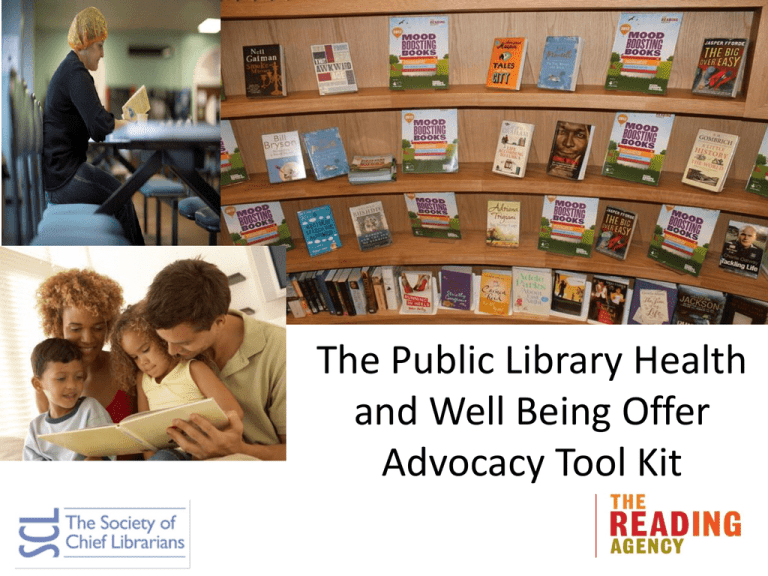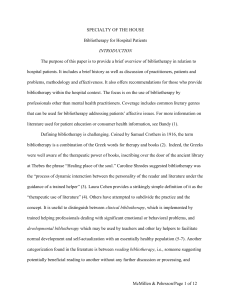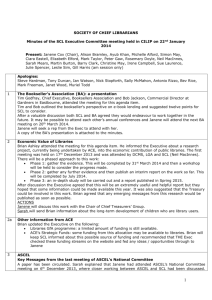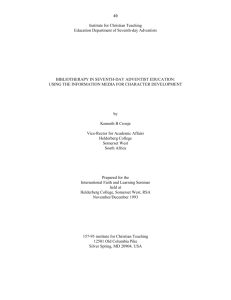The Public Library Health and Well Being Offer
advertisement

The Public Library Health and Well Being Offer Advocacy Tool Kit Research Findings “The study found evidence of a wide range and diversity of health and well being activity in libraries. Despite this level of activity, libraries are not, however, able to articulate their health and well-being contribution particularly well, to either partners or the public” Public Library Activity in the Areas of Health and Well Being, MLA, 2010 Public Library Health Map 2011 Research Recommendations “The library health and well-being offer should be clearly defined. It should bring together core library activity e.g. health information and signposting; services to the housebound and visually impaired people; reading groups and creative bibliotherapy as well as national schemes such as Bookstart and Books on Prescription. It should also allow for innovation in service development. SCL has endorsed the development of such an offer.” Public Library Activity in the Areas of Health and Well Being, MLA, 2010 Background • Public library health mapping research and recommendations, MLA 2010 Resulting action plan led by The Reading Agency: • West Midlands regional pilot of library health offer and toolkit, 2010 • Call for local authority clusters to pilot offer, 2011 • Update of toolkit and roll out of offer with 61 authorities in 7 clusters • Part of suite of interlocking SCL offers Library Health and Well-Being Offer to Partners and the Public Health Reading - New strategy describing libraries’ health and well-being contribution - One of four developing SCL “national offers”; reading, digital, information and health - Developed with lead charitable partners The Reading Agency, piloted with 61 authorities - Strategy tied to local government improvement through Local Government Group logic model - In England, integrated in Arts Council’s development plans for libraries Information Digital The Need • Pressures on health system caused by an ageing population and long term conditions becoming more common • Stark health inequalities; people in poorest areas die 7 years earlier with higher rates of mental illness, disability, harm from alcohol, drugs and smoking • 2 million people in the UK living with sight loss, by 2050 this figure will double • By 2021, 2.2 million over 65s will be housebound or socially isolated The Need • 1 in 6 people experience mental ill-health each year • 1 in 5 older people in the community, 2 in 5 in care homes, suffer depression • People with long term conditions e.g. diabetes and heart disease, 3 times more likely to suffer mental health problems • Third of people with depression and half with anxiety disorders have no health service support • Levels of dementia predicted to increase by 62% by 2026 The Cost • NHS spends £9b annually on branded prescription medicines • Cost of medicines is rising by £600m per year • Mental ill health accounts for a quarter of the UK’s burden of illness, costing society £105b a year in England • The cost of mental health care will reach £47b by 2026, compared to £22.5b in 2007 • Dementia accounts for 66% of all mental health care costs. Policy and Planning Frameworks • National Institute of Clinical Excellence (NICE) recognition of the value of bibliotherapy • National Dementia Strategy, 2009, focus on partnership/ joint commissioning and improved community support services • No Health Without Mental Health, 2011 cross government strategy to: – Improve health and keep people well through early intervention and prevention strategies that tackling underlying causes – NHS, local government and third sector working together Policy and Planning Frameworks Volunteering recognised as delivering important health benefits. Government health policy highlights its role in: • Building social capital, reducing isolation and keeping people active, engaged and independent • Creating people-centred services, delivering choice and innovation • Enhancing the capacity of preventative care Policy and Planning Frameworks The Health and Social Care Bill, 2012, aiming to deliver better services within tight funding through: • A new focus on public health and health inequalities • Improved quality and choice for patients • Local authority responsibility for improving health outcomes, tackling the wider determinants of health and combining traditional and new approaches • Local authority Health and Well Being Boards • GP/clinician responsibility for commissioning health care New Health and Social Care Structures The Public Library Health Offer A key moment for libraries to contribute to local authority health solutions as part of the commissioning landscape Public libraries health assets include: • A network of local community hubs • Non-stigmatised, non-clinical community space • Community outreach expertise, access to vulnerable people and local knowledge • Expertise and support • Supported on-line access • Health related self -help reading programmes, services and resources, referral and signposting and social and recreational activity • Volunteering and community engagement opportunities The Power of Reading and Libraries Public libraries are experts at reading; a cost efficient , self-help, early intervention and prevention health tool delivering: • Health information and learning • Creative reading with therapeutic and mood boosting benefit • Social opportunities e.g. reading groups acting as a social connector, breaking down isolation • Contributing to the wider determinants of health and well being e.g. learning and literacy. Economic impact and value for money Learning, skills and employability Libraries’ reading work helps local authorities achieve key outcomes Health, well being and quality of life strong and safe communities (including participation) Logic model Toolbox Evidence Base • Developing library health and well being evidence base linked to universal reading offer http://www.readingagency.org.uk/about/theuniversal-reading-offer/ • Supported by local and regional case studies and evidence of impact • But evidence gaps and a need for new evaluation tools/shared approaches • Further work to develop public library health advocacy messages Health Evidence and Advocacy Strategy Sample health advocacy messages drawn from shared national evidence base. Reading improves health and wellbeing • Reading is stress busting. Research shows that reading can reduce stress levels by 67 % • An ageing population means levels of dementia are predicted to rise by 61 % by 2026. Reading can help prevent the onset of dementia by 35% • Bibliotherapy increases the self-management ability, mental agility and health literacy of older people • Books on Prescription is an effective tool for delivering psychological therapy • Social activities based on reading (reading groups/ author events) combat isolation and bring people together Libraries have a key role to play • Libraries offer important health and well being services to the public and health partners: health information, therapeutic reading and social/recreational reading activities. • There are at least 10,000 library linked reading groups New Library Health Offer Tool • Successful ACE LDI bid for shared Books on Prescription/mood boosting books scheme integrating information and creative elements of library health offer • Offering self-help reading prescriptions combined with mood boosting creative reading recommendations and social reading opportunities • Piloted across 61 authorities in 2012, roll out in 2013 • Providing quality assured delivery model, shared resources, economies of scale, raised profile and joined up learning • Department of Health endorsement supporting local health partnership development • Shared evidence and advocacy including new clinical research opportunities e.g. Nottingham University/National Institute of Health Research impact of reading proposal The Reading Agency • Delivering library health offer as part of shared work plan with SCL and ACE • Leading the Public Library Health Development Group • Providing reading for health tools and resources – – – – – • Reading challenges (6BC) Reading Groups for Everyone Moodboosting Books Volunteering (Summer Reading Challenge, My Voice) New BOP/creative reading scheme Research and partnership development e.g. Department of Health, RNIB impact of reading research, Nottingham University clinical trial Next Steps • Pilot use of the public library health offer advocacy toolkit in 2012 with 61 authorities. • Evidence gathering and feedback autumn 2012, prior to national roll out • Pilot new library health tool, BOP/creative reading scheme in January 2013 • National roll out in 2014 The Final Word! “Reading is like going on holiday without packing your bags…it’s better than any doctor’s medicine” Carer’s reading group member “Books on Prescription is a very useful resource to complement talking therapies and the use of antidepressant medication. Having peer reviewed self-help books in local libraries is an asset to the general community..” Dr Sue Pritchard, Shipston Medical Centre debbie.hicks@readingagency.org.uk References Slide 2:Public Library Activity in the Areas of Health and Well Being, Hicks et al, MLA, 2010 Slide 5:Public Library Activity in the Areas of Health and Well Being, Hicks et al, MLA, 2010 The West Midlands Public Library Health and Well Being Partnership Tool Kit, SCL West Midlands, 2010 Slide 7: www.dh.gov.uk/healthandsocialcarebill www.dh.gov.uk/healthandsocialcarebill www.actionforblindpeople.org.uk www.demos.co.uk/files/HomeAlone.pdf Slide 8:Psychiatric Morbity Among Adults Living in Private Households in Great Britain, Office of National Statistics, 2000 www.mentalhealth.org.uk/information/mental-health-overview/statistics Long –Term Conditions and Mental Health: the Cost of Co-Morbities, Centre for Mental Health/Kings Fund, 2012 (www.centreformentalhealth.org.uk) Mental Health Briefing, www.kingsfund.org.uk Paying the Price: The Cost of Mental Health Care in England to 2026, The Kings Fund, 2007. References (cont) Slide 9: www.dh.gov.uk/en/Healthcare/MedicinePharmacyandIndustry/Pharmaceuticalspriceregualtionsscheme www.dh.gov.uk/healthandsocialcarebill Paying the Price, The Kings Fund, 2007 Slide 10: National Institute for Health and Clinical Excellence, 2004, 1.4, 1.5 Living Well with Dementia: A National Dementia Strategy, DH, 2009 www.dh.gov.uk>Home>Publications Slide 11: Volunteering- Involving People and Communities in Delivering and Developing Health and Social Care Services, DH, 2009 Slide 12, 13: www.dh.gov.uk/healthandsocialcarebill Slide 14: Mapping Public Library Activity in the Areas of Health and Well Being, Hicks et al, MLA, 2010 Slide 20: Galaxy Research, Mindlab International, 2009 Paying the Price, The Kings Fund, 2007/Leisure Activities and the Risk of Dementia in the Elderly, New England Journal of Medicine 2003, 348:2508-2516 The Effectiveness of Bibliotherapy in Increasing the Self-Management Ability of Slightly to Moderately Frail Older People, Patient Education and Counselling, 61 (2006), Frieswijk, D. Bibliotherapy as a Means of Delivering Psychological Therapy, Neil Frude, Clinical Psychology (39), 8-10, 2004 Reading Groups and Public Library Research, TRA/BML, 2002, A National Public Library Programme for Reading Groups, The Reading Agency, 2004 Mapping Public Library Activity in the Areas of Health and Well Being, Hicks et al, MLA, 2010 Mapping Survey of Reading Groups in Libraries- England and Wales, The Reading Agency, 2008










